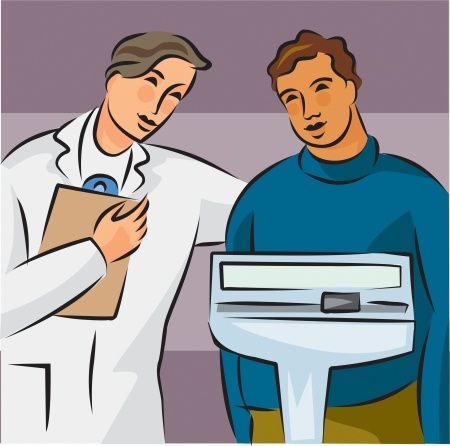
Negative bias toward overweight and obesity saturates American society. Obese people are vulnerable to being stereotyped as lazy, undisciplined, intellectually inferior, and lacking in willpower. Prejudice and discrimination permeate the workplace and the media. Physicians and other health-care providers, whether or not many would admit it, also have a negative bias toward overweight and obese patients.
Two-thirds of American adults are either overweight or obese, including many struggling health care providers. Do patients have negative bias toward physicians who are overweight or obese? Are these doctors perceived differently by their patients when compared to thinner physicians?
The patient-provider relationship is critical to the patient’s risk reduction, disease prevention, the course, and ultimately the outcomes, of health problems. Addressing health behaviors, such as exercise, diet, smoking, alcohol, and recreational drug usage is pivotal on the doctor-patient relationship, as is counseling patients on appropriate treatment and lifestyle changes. Can health behaviors of physicians have a negative impact on patient care as the result of patients’ actual or perceived health-related behaviors of their physicians?
It has been found that “normal weight” physicians are more confident in their weight management practices. They have more positive expectations for patient health outcomes. Undesirable personal health behaviors of physicians have been associated with decreased credibility. It has been found that physicians who disclose information about their own health, exercise, and diet are perceived as more believable, healthier, and more motivating, compared to physicians who do not disclose personal health behaviors. Patients are less likely to follow a treatment plan from a physician they see as unhealthy. It has been demonstrated that patients report mistrust of heavier physicians and often change providers from those they perceive as unhealthy.
Some suggest that to strengthen the physician-patient relationship, overweight or obese physicians should discuss their weight during office visits with new patients and when discussing behaviors such as diet and exercise. A start is, “I’m overweight, so I really understand how hard it is to change your eating habits. I’m trying to do that, too, but sometimes I’m not successful.” Physicians’ efforts to show patients that they’re human and that they struggle with health problems, just like everyone else, could lessen the weight bias in patient encounters. To further motivate patients, an overweight doctor could share weight-loss tips which work for him.
Overweight and obese doctors should seek medical care for their own health. Doctors shouldn’t become their own patients. Among the key factors for overweight in physicians is a lack of work-life balance, insufficient time to eat and exercise properly, stress, and too little sleep. Small spurts of exercise, such as a brisk, 10-minute walk, or using the stairs instead of taking the elevator, are good first steps in positive change.
Weight is just one aspect of appearance affecting credibility, trust, and effectiveness. A recent article published by the American Medical Association in American Medical News, states that about a third of patients and their family members rank professional appearance as quite important. Tattoos and body piercings have a significant negative effect on first impressions of a physician. An easy-to-read name tag and neat grooming were considered favorable. A white coat or scrubs made a good impression. Respondents associated professional attire with honesty, knowledge, and better care. That was even more important than age – typically an indicator of experience and credibility.
Preferences may change as Millennials age and become the family members holding vigil for the elderly. For now, though, it may be wise, and at least considerate, to think about removing some piercings, covering tattoos, and putting on a white coat. It’s a small price to pay for a genuine, favorable impact on patients and their families.
References
Puhl RM, Gold JA, Luedicke J, DePierre JA. The effect of physicians’ body weight on patient attitudes: implications for physician selection, trust and adherence to medical advice. Int J Obes (Lond). 2013 Nov; 37(11):1415-21
American Medical News: Overweight doctors lose credibility on health advice. http://www.amednews.com/article/20130401/health/130409982/4/
